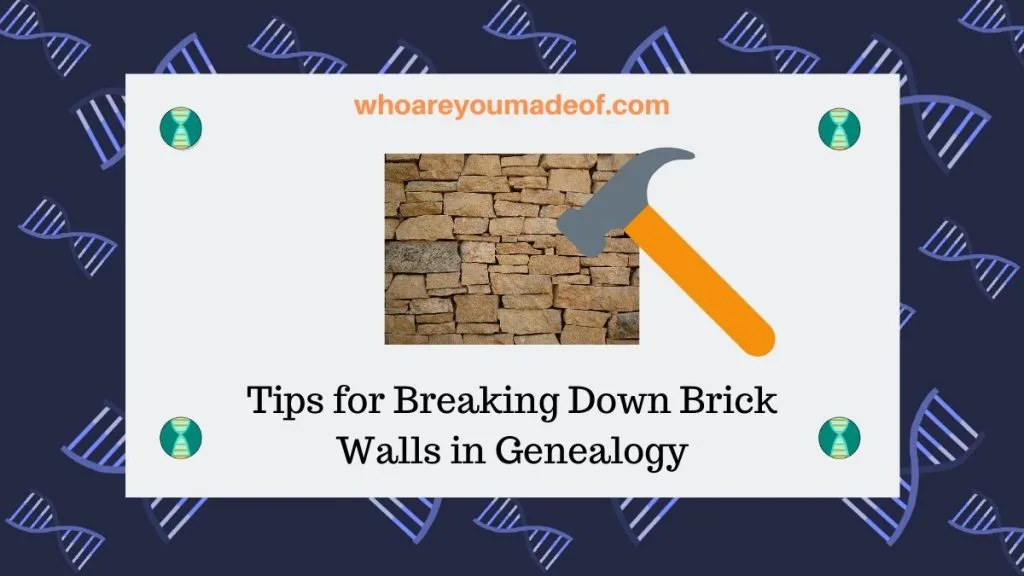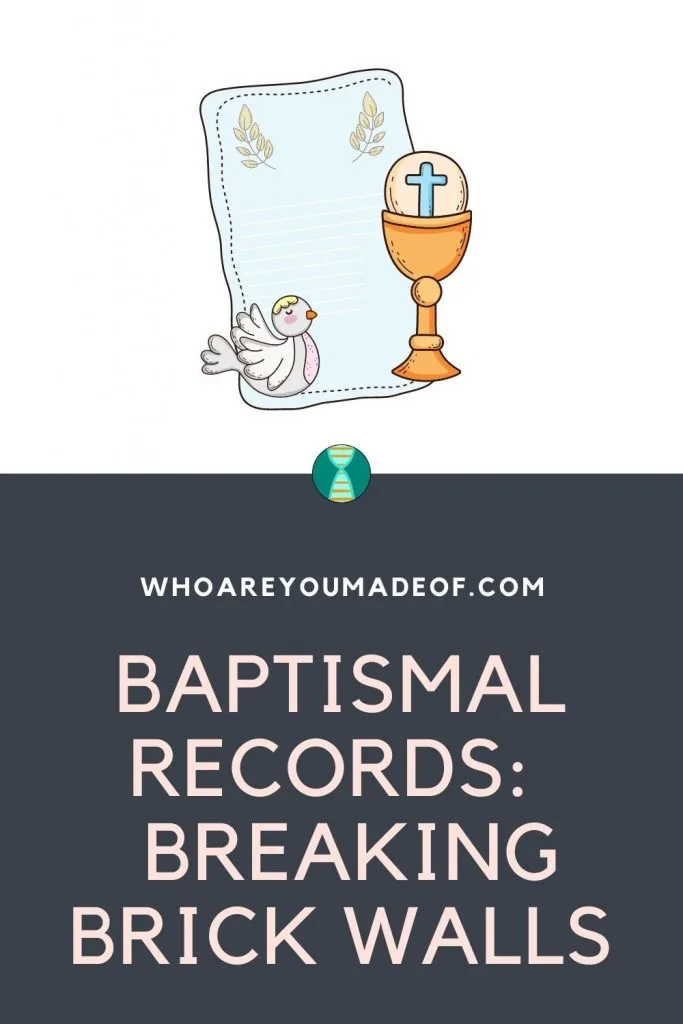Did you know that baptismal records can be a great way to break down a brick wall, or tough mystery, in your family tree? Here, learn what you can find out from these religious records and how they can help you learn more about your ancestors.
Piecing together our ancestor's lives can be a difficult, time-consuming, and difficult task, especially if we have encountered a "brick wall", or can't seem to locate any further details about a particular person.
I have a pesky brick wall in my own tree, and in this post, I will explain how viewing an original baptismal certificate about someone who is not my direct ancestor may have helped me chip away, ever so slightly, at my brick wall.

My "brick wall" is a great-great grandmother on my maternal grandmother's side of the family. This great-great grandmother was Polish and has a unique surname with a relatively unique spelling.
I have spent hours upon hours upon hours scouring online databases looking for any proof that she was a real person. One reason that I can't find good records for her is because she arrived after the 1880 Federal Census was taken, and of course, we know about how most of the 1890 Federal Census records were destroyed in a fire.
The only thing that I know for sure is that she was a real person, since my great-grandfather had a mother. This fact is without dispute.
To break through your brick wall, take stock of what you already know
The first step to figuring out whether acquiring the baptismal records of your ancestor or other relatives is a good use of time and resources is to take stock of what you have already learned about your relative. It may be that the information on their religious record may be already known by you.
I have good luck finding out information about my mysterious great-great grandmother's oldest son, who was my great-grandfather's half-brother. Using information obtained from an online vital record which referred to his baptism and birth, I requested his original birth certificate from the State of New Jersey.
My great-great uncle's birth certificate arrived with a "supplemental" addition that contained information from the church as proof of his birth, since he applied for a birth certificate as an adult. This has been the best record relating to my great-great grandmother that I had found, but I still have a lot to learn about her.
Last week, I was driving through a New Jersey town and I realized that the church where he was baptized was located on the same road where I was driving. I needed more information about my great-great grandmother, so I decided that it would be worth the time to see if the church could be of any help to me.
Let's just say that I took a detour that day.
Actually, there was a real detour on the winding road, but I did eventually end up at the church. It was less than 10 minutes out of my way, and I am definitely very glad that I made that stop that day.
It might sound strange to those who don't do family tree research, but for the first time, I felt that I was getting close to finding my great-great grandmother. I was walking on the same church property where she once walked, at least to take her son to be baptized on Christmas Day, 1897.
What kind of information is on the baptismal certificate?
Baptismal certificates and records contain a lot of information. For example, you can often find the full names and addresses of parents, their signatures, names and addresses of witnesses or godparents, names of other relatives, such as grandparents, and the name of the priest.
Locating a baptismal record often provides another big clue just on its own, since you now have verified the religion of your ancestor and their parents. This can help you locate additional records about your ancestor and provide cultural clues.
When I visited that New Jersey church, I didn't know if the person in the church office would be able to help me, or if she would just refer me to another office where old records are kept. To my surprise, the woman was extremely friendly and helpful.
She knew right where the old books were from 1897, and she was able to locate my great-great-great uncle's record. He was the very last baptism recorded in 1897, which she located within just a few minutes of grabbing the book from the shelf.
It also surprised her that he was baptized on Christmas Day, since she says that they typically don't do baptisms on Christmas unless there is an urgent need, such as an illness. I know that my great-great grandmother's husband died between 1897 and 1903, when she remarried.
Was her husband ill, and is that why they chose to baptize on Christmas? I still don't know, but I was able to learn some important details from the information on the record.
There were more details contained on the original entry in the church's baptismal records than was reported on the birth certificate supplement or in the online index. Plus, I got to see my great-great grandmother's signature, in her own handwriting.
Listed in the same line on an adjacent page are the names of my great-great uncle's two sponsors, or godparents. These people may or may not be related to me, or even to my great-great uncle. In the next section, I'll explain why these names are useful.
How can godparents or sponsor's names be useful for genealogy research?
Names of godparents, sponsors, or other relatives listed on baptismal records can be important because they can provide context and clues about our ancestors' lives. For example, the godparents could be relatives, neighbors, or friends, which could help narrow down the search for other records about our ancestor.
If I can't even find my great-great grandmother anywhere, am I just creating more mysteries for myself by adding more names to the list of people I am trying to learn about?
The answer is yes, and no. I am definitely adding to my work pile, but with the addition of these brand-new names to my list, I have dramatically increased my chances of learning where my ancestor lived, and maybe even more about her family.
For example, on my great-great uncle's birth certificate, I noticed that his godmother's name was Bertha Bolinski. This name was completely unknown to me.
I had never seen it before, even though she was listed as his godmother on his state vital record. At first glance, this name did not match the information on his baptismal certificate. His godmother's name, according to the Catholic Church, is Beta Rahwal.
A little more research reveals that Beta Rahwal is actually Bertha Bolinski, since Beta went by a more "American" Bertha and married a man with the surname Bolinski. This also makes perfect sense, since Bertha would only have been 17 at the time she became my great-great uncle's godmother, but may have married soon after.
I don't know where all of my research on my great-great uncle's godparents will lead me, but the hope is that I will be able to figure out how they knew my ancestor.
Were they from the same region in Poland? Were they neighbors at some point? Did my great-great grandmother's husband know Bertha's father from work, or was he related to her?
On this note, I noticed someone with the same surname of Rahwal married a person with the same name as my great-great grandmother's husband. Is this man his brother? So many questions, but it truly is a fascinating mystery that I enjoy solving.
I still have an incredible amount of work to do, but I feel like the addition of these sponsors names to my knowledge pool gives me an excellent chance of figuring out who my great-great grandmother really was, and hopefully, where she came from.
Conclusion
I highly recommend obtaining the original of any document that pertains to your target ancestor, since you never know which small detail left off the index might give you the clue that you need to solve your own mystery.
If you have any questions about something that you read in this post, or would like to share your own experience about learning from a baptismal certificate, I would love to hear from you in the discussion below.
Thanks for stopping by!

